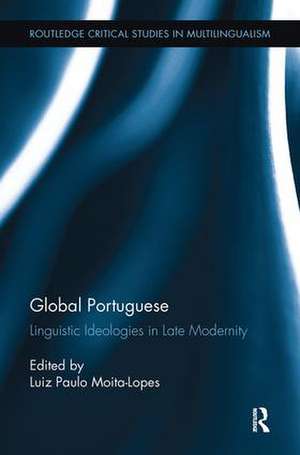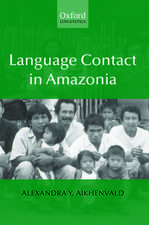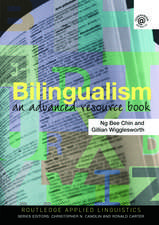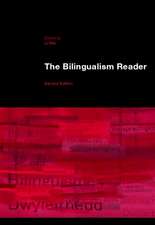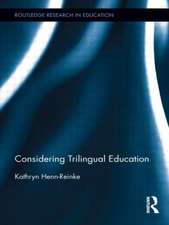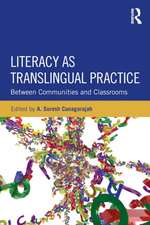Global Portuguese: Linguistic Ideologies in Late Modernity: Routledge Critical Studies in Multilingualism
Editat de Luiz Paulo Moita-Lopesen Limba Engleză Paperback – 12 feb 2018
| Toate formatele și edițiile | Preț | Express |
|---|---|---|
| Paperback (1) | 436.14 lei 6-8 săpt. | |
| Taylor & Francis – 12 feb 2018 | 436.14 lei 6-8 săpt. | |
| Hardback (1) | 1055.51 lei 6-8 săpt. | |
| Taylor & Francis – 23 dec 2014 | 1055.51 lei 6-8 săpt. |
Din seria Routledge Critical Studies in Multilingualism
-
 Preț: 371.71 lei
Preț: 371.71 lei -
 Preț: 311.66 lei
Preț: 311.66 lei -
 Preț: 310.37 lei
Preț: 310.37 lei - 21%
 Preț: 268.93 lei
Preț: 268.93 lei - 18%
 Preț: 899.08 lei
Preț: 899.08 lei - 20%
 Preț: 262.14 lei
Preț: 262.14 lei -
 Preț: 491.17 lei
Preț: 491.17 lei -
 Preț: 389.66 lei
Preț: 389.66 lei -
 Preț: 449.41 lei
Preț: 449.41 lei - 18%
 Preț: 1001.39 lei
Preț: 1001.39 lei -
 Preț: 449.41 lei
Preț: 449.41 lei -
 Preț: 385.47 lei
Preț: 385.47 lei - 18%
 Preț: 998.88 lei
Preț: 998.88 lei -
 Preț: 384.59 lei
Preț: 384.59 lei -
 Preț: 385.84 lei
Preț: 385.84 lei - 28%
 Preț: 740.82 lei
Preț: 740.82 lei -
 Preț: 445.38 lei
Preț: 445.38 lei - 18%
 Preț: 1000.61 lei
Preț: 1000.61 lei -
 Preț: 429.41 lei
Preț: 429.41 lei -
 Preț: 442.32 lei
Preț: 442.32 lei - 26%
 Preț: 847.73 lei
Preț: 847.73 lei -
 Preț: 390.63 lei
Preț: 390.63 lei - 18%
 Preț: 1001.87 lei
Preț: 1001.87 lei -
 Preț: 486.38 lei
Preț: 486.38 lei - 18%
 Preț: 1000.45 lei
Preț: 1000.45 lei -
 Preț: 487.37 lei
Preț: 487.37 lei - 18%
 Preț: 1001.39 lei
Preț: 1001.39 lei - 30%
 Preț: 847.34 lei
Preț: 847.34 lei -
 Preț: 388.72 lei
Preț: 388.72 lei - 18%
 Preț: 1010.26 lei
Preț: 1010.26 lei - 26%
 Preț: 848.54 lei
Preț: 848.54 lei - 18%
 Preț: 1000.27 lei
Preț: 1000.27 lei -
 Preț: 384.48 lei
Preț: 384.48 lei
Preț: 436.14 lei
Nou
Puncte Express: 654
Preț estimativ în valută:
83.46€ • 87.43$ • 69.17£
83.46€ • 87.43$ • 69.17£
Carte tipărită la comandă
Livrare economică 09-23 aprilie
Preluare comenzi: 021 569.72.76
Specificații
ISBN-13: 9781138499096
ISBN-10: 1138499099
Pagini: 248
Ilustrații: 1
Dimensiuni: 152 x 229 x 13 mm
Greutate: 0.45 kg
Ediția:1
Editura: Taylor & Francis
Colecția Routledge
Seria Routledge Critical Studies in Multilingualism
Locul publicării:Oxford, United Kingdom
ISBN-10: 1138499099
Pagini: 248
Ilustrații: 1
Dimensiuni: 152 x 229 x 13 mm
Greutate: 0.45 kg
Ediția:1
Editura: Taylor & Francis
Colecția Routledge
Seria Routledge Critical Studies in Multilingualism
Locul publicării:Oxford, United Kingdom
Public țintă
Postgraduate and UndergraduateCuprins
Introduction: Linguistic Ideology: How Portuguese is Being Discursively Constructed in Late Modernity Luiz Paulo Moita-Lopes 1. Language Policy and Globalization: The Portuguese Language in the Twenty First Century Gilvan Müller de Oliveira 2. Portuguese Language Globalism Inês Signorini 3. Policing the Borderland in a Digital Lusophone World Territory: The Pragmatics of Entextualization Branca Falabella Fabrício 4. Portuguese as a Communicative Resource in a Globalized World: The How and Why of New Directions in Theory-Building Luiz Paulo Moita-Lopes 5. From Prefigured Speaker Identities to the Disinvention of Portuguese Joana Plaza Pinto 6. Sociolinguistic Tensions in the Portuguese/Lusophone Community of Toronto, Canada Emanuel da Silva 7. Migrations, Multilingualism and Language Policies in Portugal and in the UK: A Polycentric Approach Clara Keating, Olga Solovova and Olga Barradas 8. Language Practices and Identities in Transit: Spanish and Portuguese in Everyday Life in a Uruguayan School Community near the Border with Brazil Leticia Soares Bortolini, Pedro de Moraes Garcez and Margarete Schlatter 9. Portuguese and African Languages in Education in Mozambique: Language Ideological Debates about Unity and Diversity Samima A. Patel and Marilda C. Cavalcanti 10. Conflicts Around the (de-)Construction of Legitimate Language(s): The Situation of Portuguese in the Multilingual Context of East-Timor Alan Silvio Ribeiro Carneiro Afterword Chris Stroud
Notă biografică
Luiz Paulo Moita-Lopes is Professor of Applied Linguistics at Federal University of Rio de Janeiro and a Researcher of the Brazilian National Council for Scientific and Technological Development.
Recenzii
"This volume’s originality rests with its focus upon Portuguese as a palpable example for working through theories and concepts of linguistic globalization. Instead of merely presenting theoretical approaches, the use of a concrete example such as Portuguese across the world speaks to the multiple, transnational, transcultural, and transidiomatic characteristics of languages in a world of intense and complex cultural movement." –Nelson Vieira, Brown University, USA
"The contributions are diverse (discourse analyses, ethnographies, participant observations, interviews, etc.) but theoretically coherent (post-modern). The volume covers a multiplicity of geographic areas (Europe, America, Asia and Africa) where Portuguese is spoken as a majority language (Brazil, Portugal, Mozambique and East Timor) and a minority language (Canada, Uruguay)." —Ana M. Carvalho, University of Arizona, USA
"A timely and fascinating volume of essays bringing current cutting-edge debates on linguistic ideologies in an era of globalization and super-diversity to analyze linguistic policies, ideologies, practices and attitudes of the Portuguese-speaking world." —Clare Mar-Molinero, University of Southampton, UK
"The contributions are diverse (discourse analyses, ethnographies, participant observations, interviews, etc.) but theoretically coherent (post-modern). The volume covers a multiplicity of geographic areas (Europe, America, Asia and Africa) where Portuguese is spoken as a majority language (Brazil, Portugal, Mozambique and East Timor) and a minority language (Canada, Uruguay)." —Ana M. Carvalho, University of Arizona, USA
"A timely and fascinating volume of essays bringing current cutting-edge debates on linguistic ideologies in an era of globalization and super-diversity to analyze linguistic policies, ideologies, practices and attitudes of the Portuguese-speaking world." —Clare Mar-Molinero, University of Southampton, UK
Descriere
This book aims at deconstructing and problematizing linguistic ideologies related to Portuguese in late modernity and questioning the theoretical presuppositions which have led us to call Portuguese ‘a language.’ The book covers a wide range of social, political and historical contexts in which ‘Portuguese’ is used (in Brazil, Canada, East-Timor, England, Portugal, Mozambique and Uruguay), and considers diverse linguistic practices. Through this critique, contributors chart new directions for research on language ideologies and language practices and consider ways of developing new conceptual compasses that are better attuned to the sociolinguistic realities of the late modern era.
